20-08-2020
By SJA Jafri + Bureau Report + Agencies
JERUSALEM/ WASHINGTON/ DUBAI/ RIYADH/ ISLAMABAD: Saudi Arabia says it will not follow the United Arab Emirates in establishing diplomatic ties with Israel until it has signed an internationally-recognized peace accord with the Palestinians.
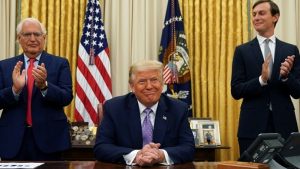 The UAE last week became the first Gulf state to normalize relations with Israel, in a US-brokered accord that raised the prospect of similar deals with other Arab states – including Saudi Arabia.
The UAE last week became the first Gulf state to normalize relations with Israel, in a US-brokered accord that raised the prospect of similar deals with other Arab states – including Saudi Arabia.
But after days of conspicuous silence and in the face of US pressure to announce a similar deal, Saudi Arabia’s Foreign Minister Prince Faisal bin Farhan ruled out the possibility until the Palestinian issue is resolved.
“Peace must be achieved with the Palestinians” on the basis of international agreements as a pre-condition for any normalisation of relations, Prince Faisal told reporters during a visit to Berlin on Wednesday.
“Once that is achieved all things are possible,” he added, in a comment that was consistent with Saudi Arabia’s previous stance on the issue.
US President Donald Trump said he expected Saudi Arabia to join the agreement announced last week by Israel and the UAE to normalize diplomatic ties and forge a broad new relationship.
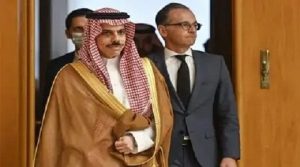 “I do,” Trump replied on Wednesday when asked at a White House news conference if he expected Saudi Arabia to join.
“I do,” Trump replied on Wednesday when asked at a White House news conference if he expected Saudi Arabia to join.
Under the accord, which Trump helped broker, Israel agreed to suspend its planned annexation of areas of the occupied West Bank. The agreement also firms up opposition to regional power Iran, which the UAE, Israel and the US view as the main threat in the Middle East.
Prince Faisal said the kingdom remained committed to peace with Israel on the basis of a 2002 Arab Peace Initiative.
He reiterated criticism of Israel’s “unilateral policies” of annexation and building settlements in the occupied West Bank as “illegitimate” and “detrimental” to a two-state solution but he also voiced cautious optimism over last week’s deal.
“Any efforts that result in holding back the threat of annexation could be viewed as positive,” he said.
Saudi Arabia, which does not recognize Israel, drew up the 2002 initiative by which Arab nations offered to normalize ties with Israel in return for a statehood deal with the Palestinians and full Israeli withdrawal from territory captured in 1967.
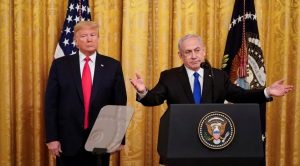 On the other hand the Kingdom of Saudi Arabia (KSA) said on Wednesday it will not follow the United Arab Emirates (UAE) in establishing diplomatic ties with Israel until the Jewish state has signed an internationally recognized peace accord with the Palestinians.
On the other hand the Kingdom of Saudi Arabia (KSA) said on Wednesday it will not follow the United Arab Emirates (UAE) in establishing diplomatic ties with Israel until the Jewish state has signed an internationally recognized peace accord with the Palestinians.
The UAE last week became the first Gulf state to normalize relations with Israel, in a historic US-brokered accord that raised the prospect of similar deals with other Arab states including Saudi Arabia but after days of conspicuous silence and in the face of US pressure to announce a similar deal, Saudi Arabia’s Foreign Minister Prince Faisal bin Farhan ruled out the possibility until the Palestinian issue is resolved.
“Peace must be achieved with the Palestinians” on the basis of international agreements as a pre-condition for any normalization of relations, Prince Faisal told reporters during a visit to Berlin.
“Once that is achieved all things are possible,” he added, in a comment that was consistent with Saudi Arabia’s previous stance on the issue.
 Prince Faisal’s remarks are the kingdom’s first official reaction since the UAE’s landmark deal with Israel, which is only the third such accord the Jewish state has struck with an Arab country after Egypt and Jordan.
Prince Faisal’s remarks are the kingdom’s first official reaction since the UAE’s landmark deal with Israel, which is only the third such accord the Jewish state has struck with an Arab country after Egypt and Jordan.
At a news conference with his German counterpart Heiko Maas, Prince Faisal reiterated criticism of Israel’s “unilateral policies” of annexation and building settlements in the occupied West Bank as “illegitimate” and “detrimental” to a two-state solution.
Tens of thousands of Pakistanis marched on Sunday against a recent, controversial deal between the United Arab Emirates (UAE) and Israel meant to normalize bilateral relations, including opening embassies in each other’s territory.
Meanwhile, rallies and demonstrations were held in the Pakistan’s capital Islamabad, port city of Karachi, northeastern city of Lahore, Rawalpindi, Peshawar, Quetta, Faisalabad, Multan, Hyderabad, and dozens of other cities and towns on the call of Jamaat-e-Islami (JI) and Milli Yakjehti Council, a religio-political alliance and pro-Taliban religious cum political party.
In the garrison city of Rawalpindi, thousands marched through the city’s thoroughfares led by Senator Sirajul Haq, chief of the country’s mainstream, Jamaat-e-Islami (JI) party.
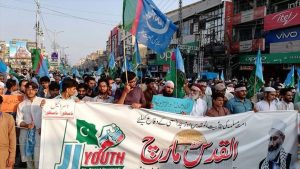 The JI observed the day as “Palestine Day” to express solidarity, and support the Palestinians’ resistance against Zionist occupation (since at least 1967).
The JI observed the day as “Palestine Day” to express solidarity, and support the Palestinians’ resistance against Zionist occupation (since at least 1967).
Carrying banners, and placards with slogans such as “Down with Israel,” “UAE-Israel deal on US pressure unacceptable,” and “Pakistanis stand with Palestinians,” among others, the protesters gathered at the historic Liaquat Park to begin the rally.
Addressing the participants, Haq said Palestine was not the issue of Arabs only but the entire Muslim world.
“Palestine is the land of Palestinians. No deal or backtracking can deprive them of their fundamental right,” he said. “Palestinians have been fighting for their land for over 70 years. But, until Aug.13 [2020] no country has disgraced itself as UAE has done… the entire Muslim world rejects this so-called deal, even if some Muslim governments accept it.”
The party chief urged Islamabad to try convening an urgent meeting of the Organization of Islamic Cooperation to discuss the latest situation.
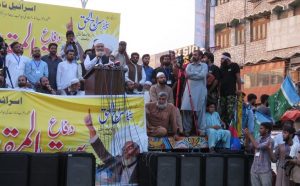 In Karachi, hundreds gathered outside the Karachi Press Club to denounce the deal.
In Karachi, hundreds gathered outside the Karachi Press Club to denounce the deal.
JI Karachi chief Hafiz Naeemur Rehman termed the deal a big blow to Muslim unity, and “backstabbing of Palestinians.”
He said neither the UAE nor any other country had the right to accept Israeli occupation of Palestinian land in the name of “peace.”
The JI held another protest outside the Lahore Press Club, which was addressed by the party’s secretary general, Ameerul Azim, and other leaders.
In Peshawar, the capital of northwestern Khyber Pakhtunkhwa province, a large number of people gathered at the historic Mahabat Khan Mosque, and marched towards Yadgar Chowk, to register their protest.
The agreement is the third Israeli-Arab peace treaty in the Middle East, and the first involving a Gulf state. While some have welcomed the deal, Palestinians, Iran and Turkey have denounced it.
 Pressmediaofindia
Pressmediaofindia




